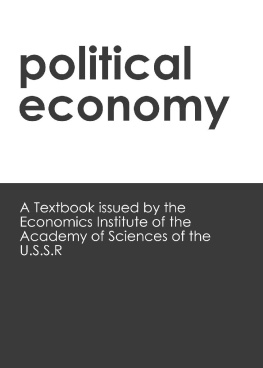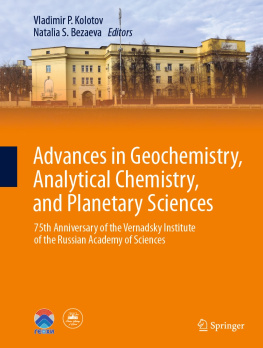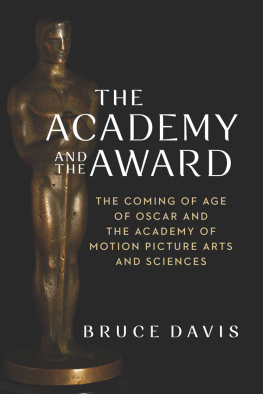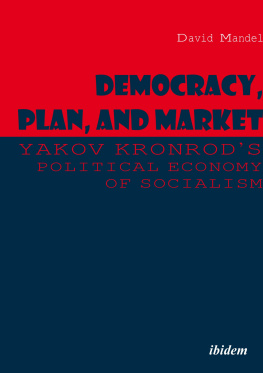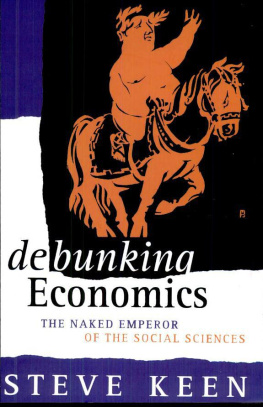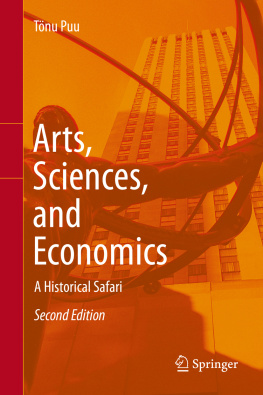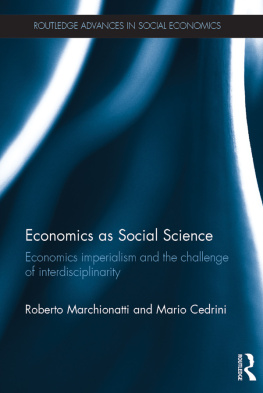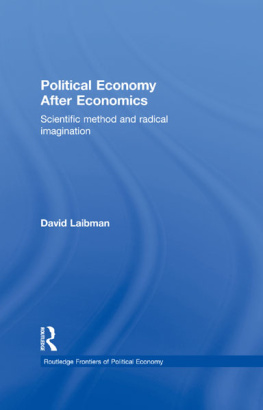Economics Institute of the Academy of Sciences of the - Political Economy
Here you can read online Economics Institute of the Academy of Sciences of the - Political Economy full text of the book (entire story) in english for free. Download pdf and epub, get meaning, cover and reviews about this ebook. genre: Science. Description of the work, (preface) as well as reviews are available. Best literature library LitArk.com created for fans of good reading and offers a wide selection of genres:
Romance novel
Science fiction
Adventure
Detective
Science
History
Home and family
Prose
Art
Politics
Computer
Non-fiction
Religion
Business
Children
Humor
Choose a favorite category and find really read worthwhile books. Enjoy immersion in the world of imagination, feel the emotions of the characters or learn something new for yourself, make an fascinating discovery.
- Book:Political Economy
- Author:
- Genre:
- Rating:4 / 5
- Favourites:Add to favourites
- Your mark:
- 80
- 1
- 2
- 3
- 4
- 5
Political Economy: summary, description and annotation
We offer to read an annotation, description, summary or preface (depends on what the author of the book "Political Economy" wrote himself). If you haven't found the necessary information about the book — write in the comments, we will try to find it.
Political Economy — read online for free the complete book (whole text) full work
Below is the text of the book, divided by pages. System saving the place of the last page read, allows you to conveniently read the book "Political Economy" online for free, without having to search again every time where you left off. Put a bookmark, and you can go to the page where you finished reading at any time.
Font size:
Interval:
Bookmark:
First published : Russian edition, 1954
Source: From the English translation of second revised and enlarged Russian edition Printed by Lawrence & Wishart, London, 1957
HTML Markup : Salil Sen for marxists.org 2014
Public Domain : Marxists Internet Archive (2014). You may freely copy, distribute, display and perform this work; as well as make derivative and commercial works. Please credit Marxists Internet Archive as your source.
This textbook on Political Economy, prepared by the Economics Institute of the Academy of Sciences of the U.S.S.R., was first published in the U.S.S.R. in 1954. Regarding political economy as the science of the laws of development of the relations of production in human society, it deals not only with the capitalist economic system but also with pre- capitalist economic relations and, in considerable detail, with the economics of socialism. In their Foreword the authors stress that their aim is not dogmatic but scientific, and that they would welcome discussion and critical comments by all readers.
This textbook of political economy has been written by a group of economists comprising: Academician K.V. Ostrovityanov; Corresponding Member of the V.S.S.R. Academy of Sciences D.T. Shepilov; Corresponding Member of the V.S.S.R. Academy of Sciences L.A. Leontyev; Member of the All- Union Lenin Academy of Agricultural Sciences I.D. Laptev; Professor I.I. Kuzminov; Doctor of Economic Sciences L.M. Gatovsky; Academician P.F. Yudin; Corresponding Member of the V.S.S.R. Academy of Sciences A.I. Pashkov; and Candidate [Master] of Economic Sciences V. I. Pereslegin, Doctor of Economic Sciences V. N. Starovsky took part in the selection and editing of the statistical information included in the textbook.
In connection with the drafting of the textbook a large number of Soviet economists made valuable critical observations and contributed numerous useful suggestions concerning the text. These observations and suggestions were taken into account by the authors in their subsequent work on the book.
Of very great importance for the work on this textbook was the economic discussion organised in November 1951 by the Central Committee of the Communist Party of the Soviet Union. In the course of this discussion, in which hundreds of Soviet economists took an active part, the draft for a textbook of political economy submitted by the authors was subjected to a thorough critical examination. The proposals worked out as the result of this discussion for improving the draft of the textbook were an important source of improvement in the structure of the textbook and of enrichment of its content.
The final editing of the textbook was carried out by comrades K.V. Ostrovityanov, D.T. Shepilov, L.A. Leontyev, I.D. Laptev, I.I. Kuzminov and L. M. Gatovsky.
Being fully aware of the importance of a Marxist textbook of political economy, the authors intend to continue to work on further improvement of the text, on the basis of critical observations and suggestions which readers may make when they have acquainted themselves with the first edition. In this connection, the authors request readers to address their comments and suggestions on the textbook to the following address:
Institute of Economics,
U.S.S.R. Academy of Sciences,
14 Volkhonka,
Moscow
The first edition of the Political Economy textbook, published at the end of 1954 in over six million copies, was rapidly sold out. Besides the Russian original, there were versions in many of the languages of the peoples of the U.S.S.R., and the book was also published in a number of foreign countries.
The need has arisen for a second edition of the textbook. In preparing this edition the authors have made it their task to strengthen the text with new propositions and facts reflecting the steady growth of the socialist economy of the U.S.S.R. and the countries of Peoples Democracy and also the further intensification of the general crisis of capitalism.
The authors have endeavoured to take into account as fully as possible the experience gained in using this textbook in higher educational institutions, in Party schools and study- groups and for purposes of individual study. During the past year the book has been discussed in many university departments of political economy, and these have sent in their comments and requests. The authors have also received a large number of letters from readers, containing suggestions regarding the text. Broad conferences of economists were held in March and April 1955 to discuss thoroughly the first edition of the book, these being attended by research workers, teachers and business executives in Moscow, Leningrad, Kiev, Minsk, Riga, Tallinn, Vilnius, Tbilisi, Erevan, Baku, Tashkent, Ashkhabad, Stalinabad, Alma-Ata and Sverdlovsk.
The authors have carefully studied all the critical observations and proposals regarding the textbook which have been made at conferences of university departments of political economy, at meetings of economists and in readers letters, and have tried to use all of these that made for improving the book. At the same time they have maintained as their point of departure the need to keep to the present type of textbook, intended for the general reader, and not to allow its size to be enlarged to any considerable extent.
The final editing of the second edition has been carried out by comrades K.V. Ostrovityanov, D.T. Shepilov, L.A. Leontyev, I.D. Laptev, I.I. Kuzminov and L. M. Gatovksy.
Comrade V.N. Starovsky took part in the selection and editing of the statistical information contained in the book.
The authors express their thanks to all the comrades who helped in the preparation of the second edition of this textbook through their critical comments and suggestions. The authors intend to continue to work on the improvement of the textbook, and in this connection request readers to send their comments and suggestions to the following address:
Institute of Economics,
U.S.S.R. Academy of Sciences,
14 Volkhonka,
Moscow
September I955
Political economy belongs to the category of the social sciences.. It studies the laws of the social production and distribution of material wealth at the various stages of development of human society.
The basis of the life of society is material production. In order to live, people must have food, clothing and other material means of life. In order to have these, people must produce them, they must work.
Men produce the material means of life, i.e., carry on their struggle with nature, not as isolated individuals but together, in groups and societies. Consequently, production is always and under all circumstances social production, and labour is an activity of social man.
The process of producing material wealth presupposes the following factors: (1) human labour; (2) the subject of labour; and (3) the means of labour.
Labour is a purposive activity of the human being in the process of which he transforms and adapts natural objects so as to satisfy his own requirements. Labour is a natural necessity, an indispensable condition for mans existence.Without labour human life itself would be impossible.
Everything to which mans labour is directed is a subject of labour. Subjects of labour may be directly provided by nature, as, for example, wood, which is cut in the forest, or ore, which is extracted from the bowels of the earth. Subjects of labour which have previously been subjected to the action of labour (e.g., ore in a metal works, cotton in a spinning mill, yarn in a weaving mill) are called raw materials.
Font size:
Interval:
Bookmark:
Similar books «Political Economy»
Look at similar books to Political Economy. We have selected literature similar in name and meaning in the hope of providing readers with more options to find new, interesting, not yet read works.
Discussion, reviews of the book Political Economy and just readers' own opinions. Leave your comments, write what you think about the work, its meaning or the main characters. Specify what exactly you liked and what you didn't like, and why you think so.

